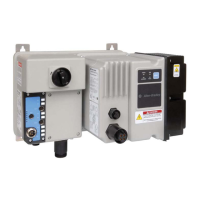Rockwell Automation Publication 2080-UM002N-EN-E - November 2022 63
Chapter 5 Communication Connections
Priority Polling Range –
High
Select the last slave station address to priority poll. 0
Priority Polling Range –
Low
Select the first slave station address to priority poll. Entering 255
disables priority polling.
255
Normal Polling Range –
High
Select the last slave station address to normal poll. 0
Normal Polling Range –
Low
Select the first slave station address to normal poll. Entering 255
disables normal polling.
255
Normal Poll Group Size
Enter the quantity of active stations located in the normal poll
range that you want polled during a scan through the normal poll
range before returning to the priority poll range. If no stations
are configured in the Priority Polling Range, leave this parameter
at 0.
0
Reply Message Wait
Timeout
Defines the amount of time, in 20 ms increments, that the
master station will wait after receiving an ACK (to a master-
initiated message) before polling the slave station for a reply.
Choose a time that is, at minimum, equal to the longest time that
a slave station needs to format a reply packet. This would
typically be the maximum scan time of the slave station.
5
Polling Mode
If you want to:
• Receive only one message from a slave station per its turn,
choose STANDARD (SINGLE MESSAGE TRANSFER PER NODE
SCAN). Choose this method only if it is critical to keep the poll
list scan time to a minimum.
• Receive as many messages from a slave station as it has,
choose STANDARD (MULTIPLE MESSAGE TRANSFER PER NODE
SCAN).
• Accept unsolicited messages from slave stations, choose
MESSAGE BASED (ALLOW SLAVES TO INITIATE MESSAGES)
• Slave station-initiated messages are acknowledged and
processed after all master station-initiated (solicited)
messages.
Slave stations can only send messages when they are polled.
If the message-based master station never sends a slave
station a message, the master station will never send the
slave station a poll. Therefore, to regularly obtain a slave
station-initiated message from a slave station, you should
choose to use standard communication mode instead.
• Ignore unsolicited messages from slave stations, choose
MESSAGE BASED (DO NOT ALLOW SLAVES TO INITIATE
MESSAGES)
Slave station-initiated messages are acknowledged and
discarded. The master station acknowledges the slave
station-initiated message so that the slave station removes
the message from its transmit queue, which allows the next
packet slated for transmission into the transmit queue.
MESSAGE BASED
(ALLOW SLABES TO
INITIATE MESSAGES)
(1) For more information on DF1 protocol, see Connect to Networks using DF1 on page 335
(2) Half-Duplex and Radio Modem DF1 modes are only supported on Micro850 (2080-L50E) and Micro870 (2080-L70E) controllers.
Table 5 - CIP Serial Driver Parameters (Continued)
Parameter Options Default

